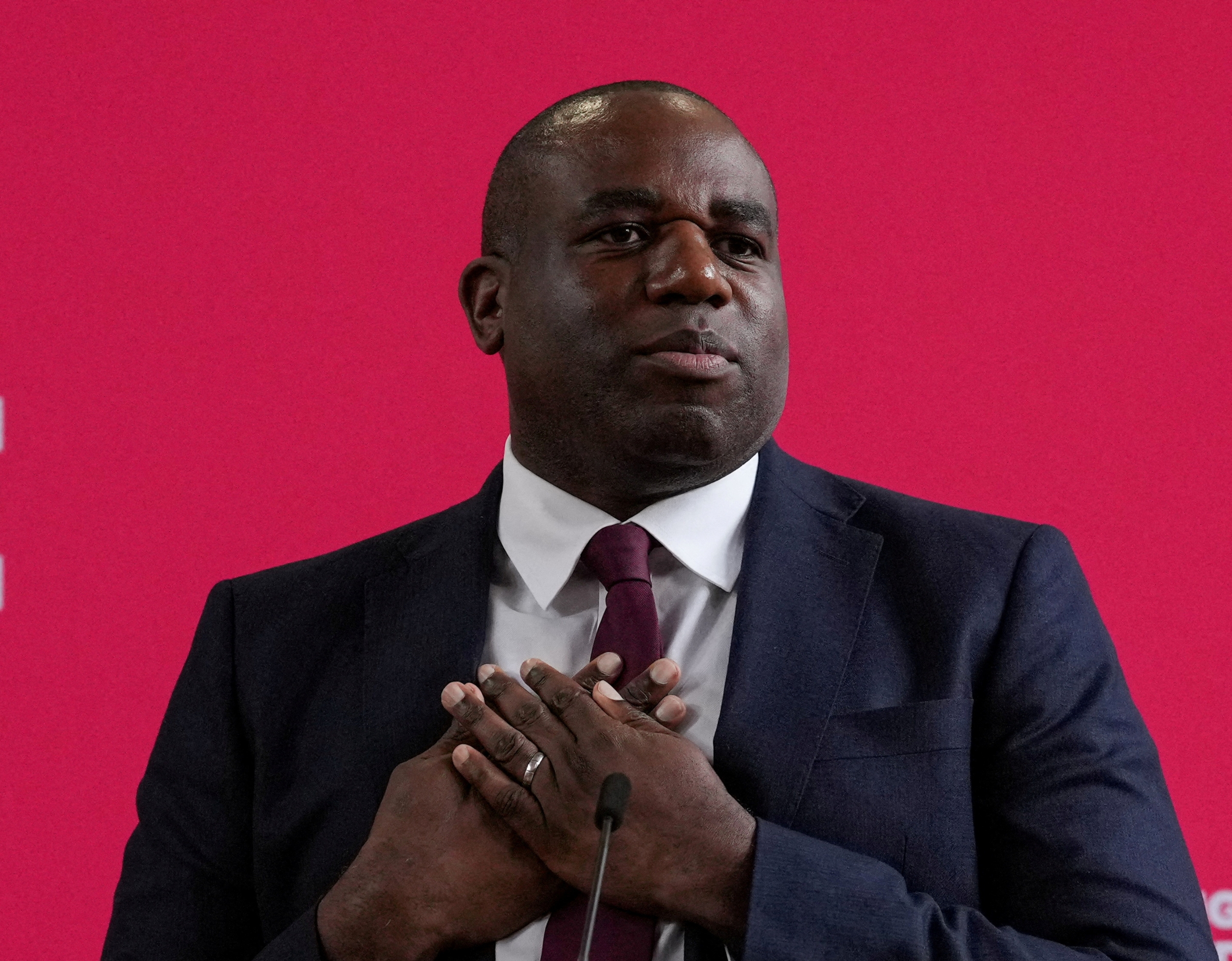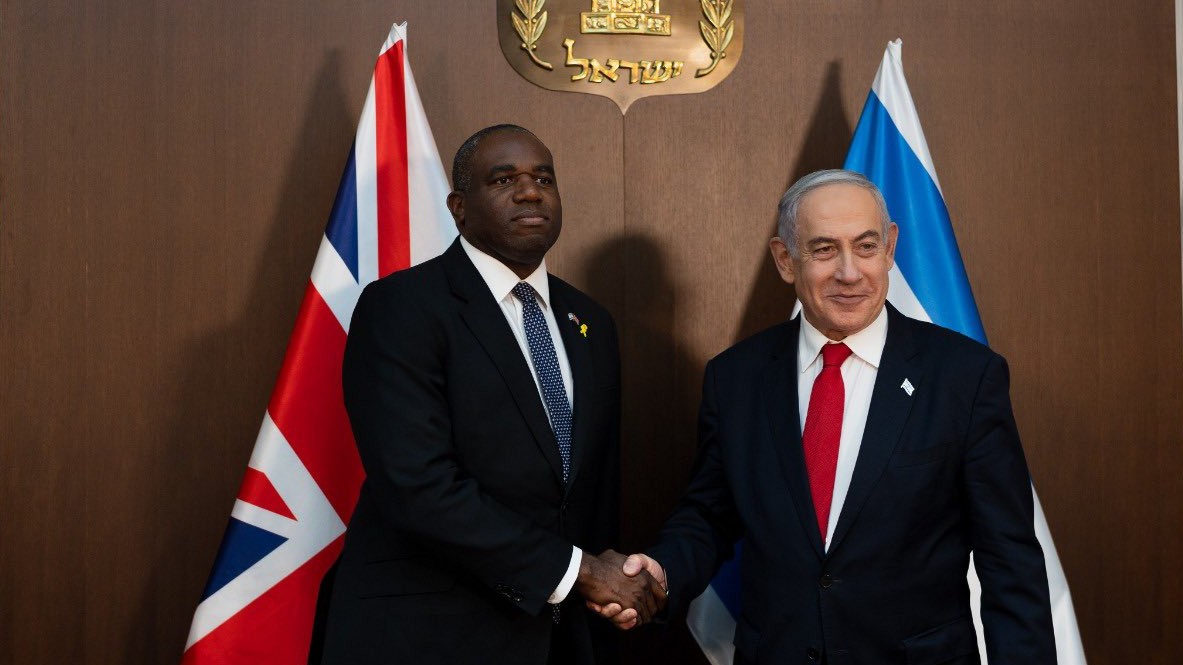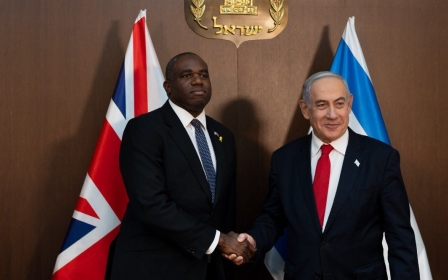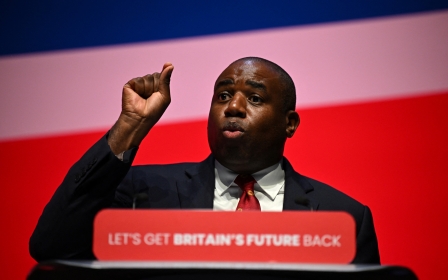Labour, Israel and the problem of David Lammy

Keir Starmer, at his first prime minister's questions in the House of Commons on Wednesday, spoke at length about UK aid to Ukraine, and a Russian attack on a hospital two weeks ago. He then turned to the Middle East, reaffirming his support for Israel's "right to security" and the need for a ceasefire, but failed to mention the many hundreds of Palestinian men, women and children slaughtered in Gaza and the West Bank by Israel since his election victory.
The new government's first King's Speech was overshadowed this week by a crackdown on left-wing Labour MPs for defying the whips on capping child benefits, seven of whom were suspended, a move that has shocked some Labour supporters.
Like Boris Johnson five years ago, who as a new prime minister expelled 21 moderate Conservative MPs, Starmer has started his government with a purge, in line with the authoritarian streak he has displayed since he became Labour leader. This intolerant approach to dissent could store up problems in the future.
Continuity with Conservative policies also applies to the Labour government's approach to the Middle East and Israel. There was barely a soon-to-be-banned cigarette paper between Rishi Sunak and Starmer at PMQs.
It's been argued that the Starmer government will not meaningfully shift UK policy on Gaza and the escalating regional conflict. This is due to the “structural realities" of declining British power and influence, and its need to remain close to the US and Europe in supporting Israel, despite the horrors it has inflicted on Palestinians.
New MEE newsletter: Jerusalem Dispatch
Sign up to get the latest insights and analysis on Israel-Palestine, alongside Turkey Unpacked and other MEE newsletters
The view that the UK has much-diminished influence, and therefore any decision to suspend arms sales to Israel or take a harder line against the Netanyahu government will have a marginal impact, has a certain superficial logic.
A similar claim is heard from supporters of Israel in the Labour Party when they are urged to take a stronger line on a ceasefire or atrocities by Israel. “If I call for a ceasefire / ending arms sales, what difference will it make?” they say.
It is certainly true that the UK’s position is much diminished in terms of influence in the Middle East. We are a junior partner in the US-led military umbrella supporting Israel and the various pro-western dictatorships that rule the region.
However, the UK still does play a critical role as a legacy imperial power with strategically vital military bases on the east Mediterranean island of Cyprus, just 390km from the coast of Gaza. It is from here that hundreds of British military flights have taken off in support of Israel’s war against Hamas and the population of Gaza.
Closer ties to Israel
Further, the UK mainland is a de facto aircraft carrier for US forces and plays a vital role as a strategic base close to Europe and the Middle East, as well as a manufacturing centre for parts for the F-35 jet programme, of which Israel is a major partner and beneficiary.
A UK withdrawal from any of its supporting functions in the US-led, pro-Israel military alliance would be a not insignificant blow, both symbolically and practically. It would not stop the war continuing, but it would leave Israel further isolated from one of its longstanding allies.
Other western allies have distanced themselves from Israel and called out its atrocities, including Spain, Belgium and Colombia. The UK could do likewise
This is especially so because since Brexit, the UK has developed much closer military ties with Israel. This entails joint military exercises held on UK soil for the first time ever, and major contracts with the Israeli high-tech war complex for Ground-Based Surveillance Radar and targeting technology to the UK armed forces. Much of this happens under the radar of public awareness because, as always, the UK media is complicit in denying information to the public about the UK’s close and growing strategic ties with Israel.
This is one of the reasons so many UK voters believe that the Gaza war is something happening “over there” with limited relevance to British politics. This is a carefully manufactured narrative that obscures the critical linkages between the UK and Israel on military, intelligence and surveillance structures.
These are “structural realities” that will make any winding down of UK-Israeli ties difficult. The sustained campaign to delegitimise the former pro-Palestine Labour leadership of Jeremy Corbyn was carried out with the goal of ensuring Labour returned to the pro-Israel fold and that in future, such a leadership could never again emerge in one of the UK’s two main parties. This has been the achievement of the Starmer takeover, his purge of left-wing members, and his road to Downing Street as a safe pair of hands.
Yet another way is possible. Other western allies have distanced themselves from Israel and called out its atrocities, including Spain, Belgium and Colombia. The UK could do likewise.
The idea that Britain doesn’t really want to get that involved in the Middle East is wholly disproven by the reality of its actions and vital interests: the UK is part of the military alliance backing Israel, bombing Yemen, and shooting down Houthi drones in the Red Sea. The UK is involved in the Middle East crisis for obvious historical reasons, and has been ever since Lord Balfour’s declaration in favour of a Jewish homeland in 1917.
Of course, the leading imperial power in the region is the US and the UK plays a marginal, supporting role. But if Labour wanted to signal disengagement, new foreign secretary David Lammy’s second foreign visit after Washington would not have been to Jerusalem, with his uneasy rictus-smile photo opportunity with a grinning Israeli Prime Minister Benjamin Netanyahu.
Nothing significant came of that visit, at least not in the public domain, other than the optics of the UK standing with Israel and treating it as an ally rather than a rogue player facing charges of genocide and war crimes at the International Court of Justice.
Lammy's lame answers
Lammy was asked in Parliament last week by a new Green MP if the government would be suspending arms export licences for UK weapons sold to Israel. His response was straight out of the decades-old playbook of Israel, painting the violent apartheid regime as a shining light in the darkness, surrounded by hostile neighbours and needing to remain armed and ready to strike at all and every threat.
"This is one of the toughest neighbourhoods in the world and Israel is surrounded by people who would see its annihilation; it’s been attacked by the Houthis, with missiles firing from Hezbollah,” he said. Lammy had nothing to say about what Israel has been doing during this time, with the killing of at least 49,500 Palestinians (including the missing, and those killed in the West Bank) and more than 500 Lebanese since October. (Lammy recently described the horrific Nuseirat massacre of 274 Palestinians, part of an Israeli-US hostage rescue operation, as "a glimmer of hope in the darkness".)
Lammy recently described the horrific Nuseirat massacre of 274 Palestinians, part of an Israeli-US hostage rescue operation, as 'a glimmer of hope in the darkness'
Lammy, while making meaningless calls for a ceasefire, will not admit that Netanyahu has sabotaged every tentative ceasefire deal, that Israel rejects out of hand a two-state solution, and that Netanyahu has stated he wants the war to continue indefinitely until Hamas is “destroyed”, which his own army has stated is not possible.
Labour's one concession has been on restarting funding to the UN Palestinian refugee agency, Unrwa - the same agency that Israel has targeted, killing 200 of its staff, and now declared a terrorist entity.
In this context, Lammy's (and Starmer’s) refusal to countenance a suspension of arms sales is de facto endorsement of Israel’s genocidal “response” to the Hamas-led attacks. No matter how many people are killed in Gaza, the West Bank, Lebanon, Syria or Yemen, with overwhelming evidence of crimes against civilians being the worst this century, Lammy and Starmer continue to support Israel in line with their bosses in Washington.
To claim that ending UK sales of arms to Israel would make no material difference to its war and therefore is a pointless gesture is a logical fallacy, not to say fatuous.
If the UK’s contributions to this genocidal campaign are truly marginal, then there is no reason to continue providing them, unless of course you do so because you do not see a problem with how Israel uses its weapons. By suspending such exports, you are showing that ethical and legal considerations matter to UK foreign policy. Conversely, continuing military sales to a country facing charges of genocide makes Lammy, Starmer et al legally complicit in those international crimes.
This week the International Court of Justice released a decisive opinion on Israel’s occupation and policies toward Palestinians - they are illegal, and all settlements in the West Bank, and the occupation of Gaza, must be dismantled forthwith.
Western powers including Britain can no longer be in any doubt that international law commands them to cease aiding Israel, and to cease providing diplomatic and political cover for its atrocities. Lammy knows this. But he has thrown his lot in with Netanyahu and his far-right government, has taken substantial donations from pro-Israel lobbyists, and has made his choice.
History will judge him harshly. Voters may one day punish him. International law may eventually catch up with him.
The views expressed in this article belong to the author and do not necessarily reflect the editorial policy of Middle East Eye.
Middle East Eye delivers independent and unrivalled coverage and analysis of the Middle East, North Africa and beyond. To learn more about republishing this content and the associated fees, please fill out this form. More about MEE can be found here.






